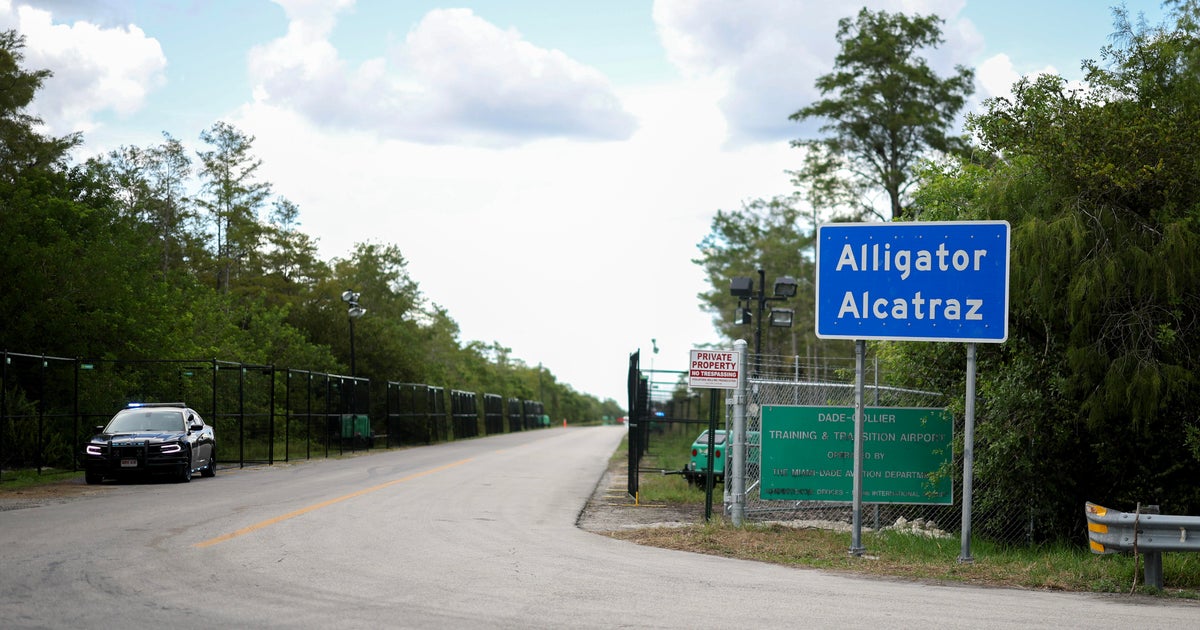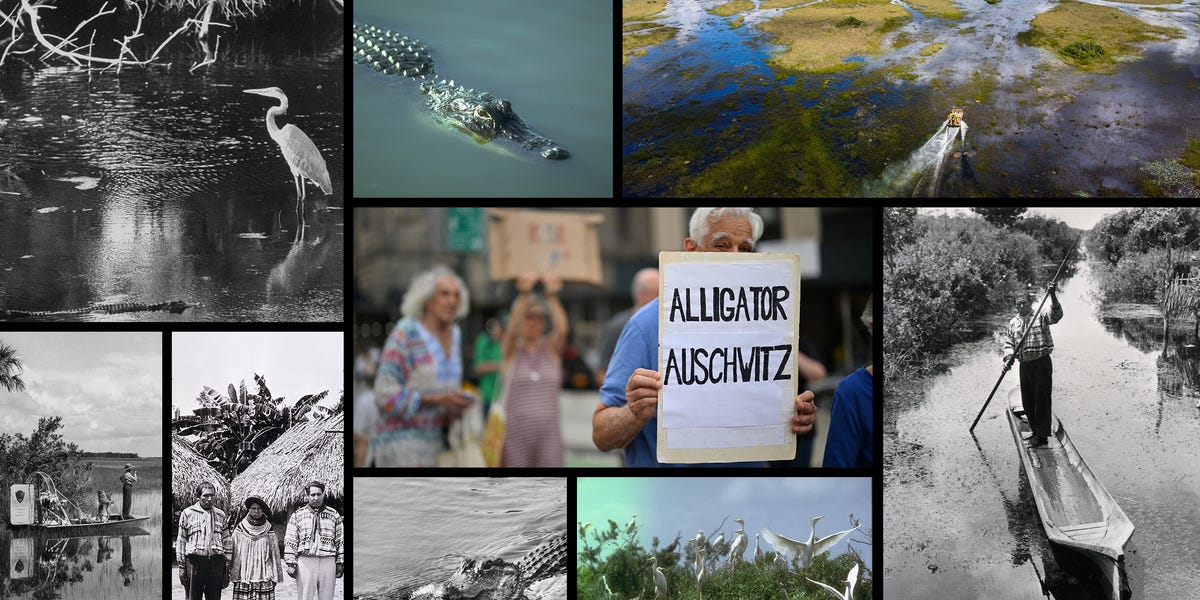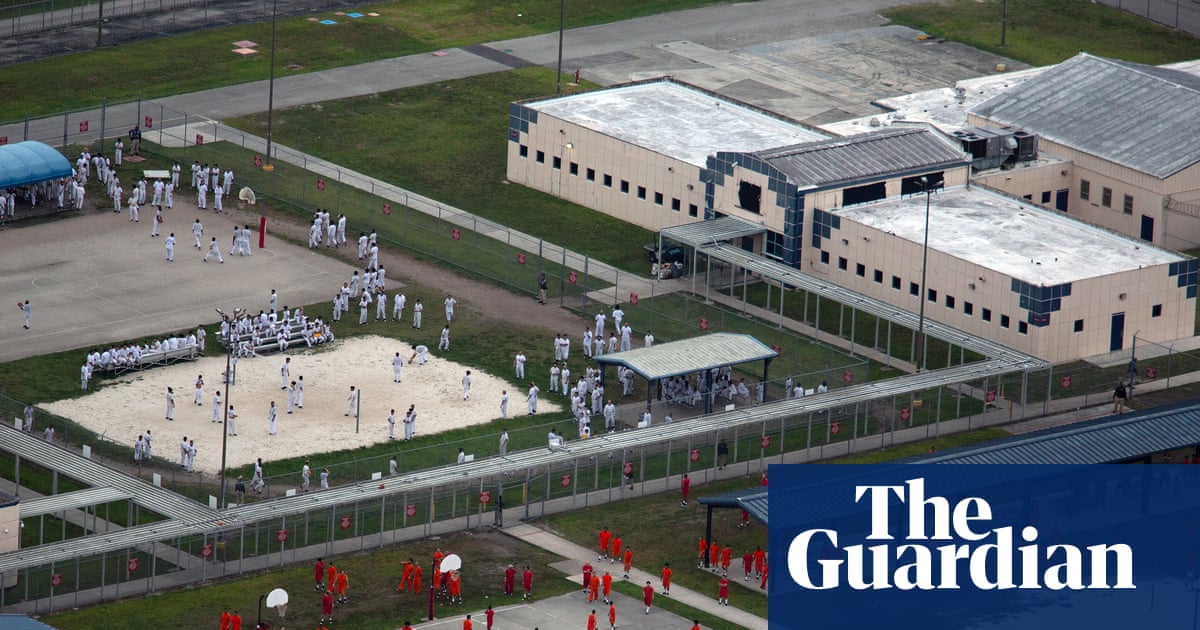On June 14, Dakota Osceola was wrapping up the day, selling her bead art and necklaces at a festival in Miami, when she heard the news from a friend.
A new immigrant detention facility, to be named Alligator Alcatraz, would be built on a 10,500-foot-long old airport strip inside the Big Cypress National Preserve in the Florida Everglades.
“How is this happening right now?” she thought.
Home of the indigenous Miccosukee and Seminole people, the Everglades are the largest wetland ecosystem in the United States and the land where Osceola’s family grew up. This territory is considered a sacred place to tribe members and a national wildlife treasure to Floridians. But in less than 10 days, a portion of the Everglades was seized by the state and paved over to make room for a new prison built to hold up to 3,000 immigrants, a move supported by the Trump administration as a means to detain undocumented people.
On June 28, in the scorching heat, Osceola decided to go voice her opposition to this detention camp. Grassroots organizations such as Friends of the Everglades and Unidos Immokalee voiced environmental and human-rights concerns. Alongside independent activists, artists from the South Florida community joined with their protest art and signs to defend the home that has inspired them and that they love.
Outside the gates of the detention facility, and in the center of the Everglades, hundreds of Floridians gathered, chanting and holding up signs. Miccosukee tribal elder and environmental activist Betty Osceola, with Love the Everglades Movement, used her megaphone to address the crowd and keep people safe. Demonstrators lined up on the narrow road, north of the Tamiami Trail, as dozens of trucks with machinery entered the old Dade-Collier Airport, where the facility was being built. In the weeks since, different organizations have continued to arrange protests and gatherings weekly in front of these gates. There have been peaceful prayer vigils with no signs allowed, a protest asking to shut down the Everglades concentration camp, and family members of detainees gathered along with grassroots human-rights organizations, and a Catholic archbishop is waiting to see if he can hold a mass at the gates.
Outside the gates of the detention facility, and in the center of the Everglades, hundreds of Floridians gathered, chanting and holding up signs. Miccosukee tribal elder and environmental activist Betty Osceola, with Love the Everglades Movement, used her megaphone to address the crowd and keep people safe. Demonstrators lined up on the narrow road, north of the Tamiami Trail, as dozens of trucks with machinery entered the old Dade-Collier Airport, where the facility was being built. In the weeks since, different organizations have continued to arrange protests and gatherings weekly in front of these gates. There have been peaceful prayer vigils with no signs allowed, a protest asking to shut down the Everglades concentration camp, and family members of detainees gathered along with grassroots human-rights organizations, and a Catholic archbishop is waiting to see if he can hold a mass at the gates.
A member of the Seminole tribe, Osceola was aware of how hard the tribes fought in the 1970s to stop the construction of the old airport due to the environmental damage it would cause to the fragile ecosystem of the Glades. That battle was won when the construction came to a halt due to growing opposition from environmentalist groups. But now, into that abandoned air strip, the construction trucks started coming in, creating more and more traffic inside the Big Cypress National Preserve. Then, a sign with the words “Alligator Alcatraz” went up overnight, sparking sinister national jokes, memes, and merch about the alligators eating anyone who tries to escape this jail.
Protesters had different reasons to voice their opposition to the detention center: It would harm a fragile ecosystem and is not environmentally sound; it is an inappropriate use of FEMA funds; conditions there are inhumane. When Florida lawmakers visited the facility on a limited tour, they described 32 people per cage in the sweltering heat, exposed to bug infestations and fed meager meals, with prisoners crying for help and even one person pleading, “I’m a U.S. citizen!”
An important point ignored in national coverage is that the construction involves a seizure by the state of Miami-Dade-owned land under the guise of an emergency. The Miccosukee tribe joined other environmental groups, such as Love the Everglades, in suing federal and state agencies for failing to conduct an environmental review, as required by federal law, before initiating the project. Meanwhile, the ACLU is suing the Trump administration because of a lack of access to counsel at the detention center.
“I see my relatives, my family, in those cages. They came here undocumented, overstayed their visas, and eventually became citizens,” says Aubrey Brown, a Florida-based storyteller and artist who contributed to the protest sign art. Brown, who shares stories about Florida’s history with her 40,000 followers on social media, couldn’t stay silent and decided to speak up against the detention center, risking backlash. “I’ve always tried to stress that history and politics are inextricably intertwined,” she adds. Challenging the false narrative used by the president to make others believe there is nothing but fierce alligators and swamps in the Everglades, Brown argues, “People must understand that the Everglades is not a wasteland; this is people’s home. The Glades are wild, sacred, and free. It’s where the Seminoles went to hide from being captured, and it is where I go when I want to get away from everything.”
Acting as if no people exist in the Everglades, the federal government decided to seize land belonging to Miami-Dade County, completely ignoring the sovereignty of tribal nations at Big Cypress and that both their ceremonial and ancestral burial grounds stand near the facility.
“When it comes to my Seminole and Miccosukee friends, people treat them like they are not here anymore and are a relic of history,” Brown adds.
Once considered a swing state, Florida is now ground zero for the MAGA base supporting cruel anti-immigration policies. Built undercover, this facility was estimated to cost taxpayers $450 million a year. However, according to a review of purchases, the state has already spent $250 million on it in less than one month.
President Trump said that the facility would cage “some of the most vicious people on the planet” to be deported. Yet, a report released by the Miami Herald debunked this narrative, showing that hundreds of the detainees have no criminal charges.
Kidnapped without a warrant, stripped of their civil rights, and placed into a black hole where attorneys cannot reach their clients, only a third of detainees have a criminal conviction. But the public cannot see the nature of the sentence they received. ICE has so far offered the press only top-level statistics, which do not show whether a sentence is for a traffic violation or a murder attempt. Not only do the reports withhold details about the alleged offenses of each detainee, but ICE has not made public the records specifying how it targets the people it takes to detention centers, especially those without criminal charges. In response, The Guardian has decided to sue the Trump administration for withholding public documents from the press, which are a matter of clear public interest right now.
Maria Theresa Barbist, a Miami-based artist and psychologist who explores trauma, memory, and collective healing in her works, attended and made signs for the protest. “I am from Austria, and we have a dark history there. We have done this before. We have put people in concentration camps, and we know how this story ends. It’s our responsibility as descendants of Nazis never to let that happen again,” she says.
“The Nazis did not start with Auschwitz; they started with driving people out of their homes and putting them into camps. It was not just Jewish people, it was immigrants too,” she adds.
“This is not the first concentration camp being placed; they are just getting warmed up. Project 2025 is going to extend for at least the next four years,” says Eddie Aroyo, an artist who explores themes of power structures and attended the protest. “This is about absolute conquest,” he adds, referring to a conservative white nationalist agenda that opposes abortion and reproductive rights, LGBTQ rights, immigrants’ rights, and racial equity.
Democratic Florida representative Maxwell Frost visited the detention center on July 13 and shared on social media, “I didn’t see any Europeans who overstayed their visa. I saw nothing but Latino men and Haitian men. They are targeting specific types of people. And it’s the type of people that look like me.”
A few miles away from the detention camp, artist and native Floridian Sterling Rook, who attended the protest, is currently completing an artist residency in the Everglades National Park. Hosted by AIRIE (Artists in Residence in Everglades), this program allows artists to explore work related to the environment. The first day he entered the residency was also the day the first buses carrying migrants arrived in the Everglades. “It’s beautiful out here, but now I think about this every day, how 30 miles away from here there are people in tents in a terrible situation,” he says. “I’m not necessarily a political artist, but you become political just by the nature of your situation,” he adds. Rook used his residency time to work on a Glades skiff boat, which is known for navigating the marshy waters of the Everglades.
“As a performance, I would love to ride it out into ‘Alligator Alcatraz,’ maybe leave it there as a symbol of rescue and escape. But I also struggle with self-censorship,” he says.
This self-censorship comes from a place of very real fear about political persecution of artists who speak up. “There are genuine and considerable threats when speaking out against any of these violent governmental policies, especially in Florida,” says Johann C. Muñoz-Tapasco, an artist and organizer affiliated with the local collective Artists for Artists Miami (A4A: MIA). “Numerous artists have chosen to disengage from sought-after exhibition platforms and institutions altogether. Others have lost their jobs and clients. Many more have self-censored as a form of self-preservation.”
Federal and state funding cuts to the arts, combined with the elimination of National Endowment for the Arts grants and Florida’s political climate, have led many artists, organizations, and institutions that depend on this funding to limit freedom of expression, fearing retaliation or even more economic cuts. AIRIE did not respond to my request for a statement on its stance on this issue. The majority of Florida’s art institutions and organizations have remained silent.
A4A: MIA is currently discussing collaborative projects and planning actions against this detention facility, but it recognizes that American artists have been woefully unprepared to respond to the rise of fascism. “Since the postwar era, the ways artists validate their work and fund their practices have been tied to the tastes and whims of those in power,” misael soto, a Miami-based artist, educator, and organizer affiliated with this organization, stated. “Now those at the top whom we’ve been dependent on, on whichever side of the political spectrum, are mostly kneeling to fascism. Artists have to come to terms with how they sustain their practices and how this is intrinsically tied to their art.”
Mae’anna Osceola-Hart, a photographer and member of the Panther Clan and the Seminole tribe, participated in organizing the protest and lives within walking distance of the detention camp. Her grandfather was one of the tribe members who fought the development of the Dade-Collier Airport. These days, the traffic on the Big Cypress reserve is becoming increasingly dangerous, and she describes seeing the wildlife already being displaced. “The deer and bears now walk on the side of the road,” she says.
“My heart sinks, seeing how this concentration camp is affecting the land that protected us indigenous people since time immemorial, the environmental impacts it’s already causing, along with how it’s already harming human beings and their rights. Just yesterday, I saw three cars coming in with people wanting to take a photo in front of the [Alligator Alcatraz] sign, treating it like a roadside attraction,” she says.
“It feels like a fever dream.”







